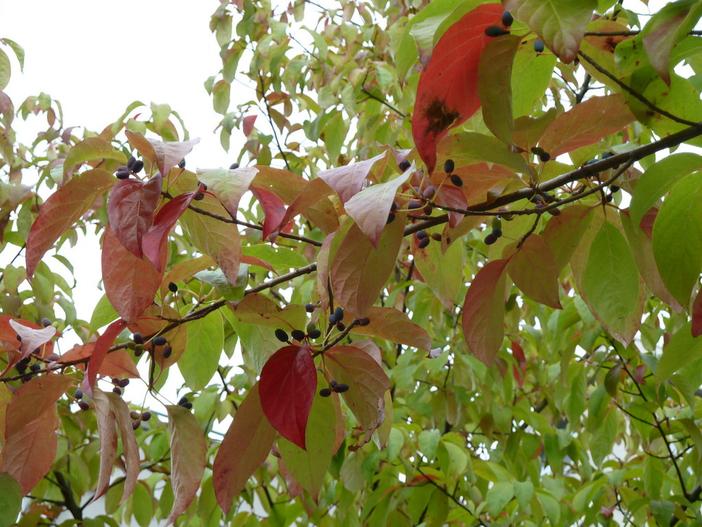Chinese Tupelo
(Nyssa sinensis)
Chinese Tupelo (Nyssa sinensis)
/
/

Wendy Cutler
CC BY-SA 2.0
Image By:
Wendy Cutler
Recorded By:
Copyright:
CC BY-SA 2.0
Copyright Notice:
Photo by: Wendy Cutler | License Type: CC BY-SA 2.0 | License URL: https://creativecommons.org/licenses/by-sa/2.0/ | Uploader: wlcutler | Publisher: Flickr



































Estimated Native Range
Summary
Nyssa sinensis, commonly known as Chinese Tupelo, is a deciduous tree native to forested wetlands, riverbanks, and pond margins in China and Vietnam. It typically grows to a height of up to 33 feet (10 meters), with a conical form and oval leaves that provide a stunning display of red, orange, and yellow colors in autumn. The tree’s bark is deeply furrowed, adding textural interest to the landscape throughout the year. Chinese Tupelo flowers are small and not particularly showy, but they give way to bluish-black fruit that is attractive to wildlife.
Chinese Tupelo is valued for its ornamental features, including its vibrant fall foliage and its adaptability to wet conditions, making it suitable for planting in areas with poor drainage or as a rain garden specimen. It is also used in urban settings for its ability to tolerate air pollution and confined soil spaces. In cultivation, it prefers full sun to part shade, consistently moist soil, and can adapt to a range of soil types, though it thrives best in acidic soils. The cultivar ’Jim Russell’ has been recognized with the RHS Award of Garden Merit for its exceptional qualities. While generally low-maintenance, Chinese Tupelo can be susceptible to leaf spot and canker diseases, and it may require pruning to maintain its shape. It is not known to be invasive when grown outside its native range.CC BY-SA 4.0
Chinese Tupelo is valued for its ornamental features, including its vibrant fall foliage and its adaptability to wet conditions, making it suitable for planting in areas with poor drainage or as a rain garden specimen. It is also used in urban settings for its ability to tolerate air pollution and confined soil spaces. In cultivation, it prefers full sun to part shade, consistently moist soil, and can adapt to a range of soil types, though it thrives best in acidic soils. The cultivar ’Jim Russell’ has been recognized with the RHS Award of Garden Merit for its exceptional qualities. While generally low-maintenance, Chinese Tupelo can be susceptible to leaf spot and canker diseases, and it may require pruning to maintain its shape. It is not known to be invasive when grown outside its native range.CC BY-SA 4.0
Plant Description
- Plant Type: Shrub, Tree
- Height: 30-50 feet
- Width: 15-30 feet
- Growth Rate: Moderate
- Flower Color: Green, White
- Flowering Season: Spring
- Leaf Retention: Deciduous
Growth Requirements
- Sun: Full Sun, Part Shade
- Water: Medium
- Drainage: Medium, Slow
Common Uses
Bird Garden, Border Plant, Low Maintenance, Potted Plant
Natural Habitat
Forested wetlands, riverbanks, and pond margins in China and Vietnam
Other Names
Common Names: Chinese Black Gum
Scientific Names: , Nyssa sinensis, Alangium shweliense, Microrhamnus bodinieri, Nyssa megacarpa, Nyssa shangszeensis, Nyssa shweliensis, Nyssa shweliensis, Nyssa sinensis var. oblongifolia, Nyssa sinensis var. sinensis
GBIF Accepted Name: